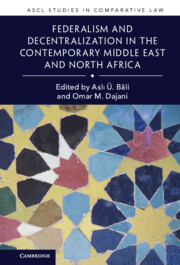Book contents
- Federalism and Decentralization in the Contemporary Middle East and North Africa
- ASCL Studies in Comparative Law
- Federalism and Decentralization in the Contemporary Middle East and North Africa
- Copyright page
- Contents
- Contributors
- Acknowledgments
- 1 Introduction
- Part I Theoretical and Comparative Context
- Part II Decentralization and Governance Reform
- Part III Decentralization and Self-determination
- Part IV Decentralization, Conflict, and State Fragmentation
- Part V Conclusions
- 19 Federalism and Decentralization in the MENA Region
- Index
19 - Federalism and Decentralization in the MENA Region
Types and Trajectories
from Part V - Conclusions
Published online by Cambridge University Press: 15 January 2023
- Federalism and Decentralization in the Contemporary Middle East and North Africa
- ASCL Studies in Comparative Law
- Federalism and Decentralization in the Contemporary Middle East and North Africa
- Copyright page
- Contents
- Contributors
- Acknowledgments
- 1 Introduction
- Part I Theoretical and Comparative Context
- Part II Decentralization and Governance Reform
- Part III Decentralization and Self-determination
- Part IV Decentralization, Conflict, and State Fragmentation
- Part V Conclusions
- 19 Federalism and Decentralization in the MENA Region
- Index
Summary
The conclusion synthesizes and reflects upon the case studies and comparative and theoretical contributions in the book. The cases are organized around three categories: first, relatively conventional decentralization initiatives in which reforms were adopted to improve governance; second, contexts in which decentralization has been contemplated as a framework for self-determination for the region’s stateless communities; and finally, decentralization initiatives undertaken in the shadow of conflict and state fragmentation. This concluding chapter develops theoretical insights drawn from the rich terrain for qualitative comparison across these three contexts. It offers reflections on key characteristics of the shared regional context and a typology of factors driving decentralization in the Middle East and North Africa (MENA) region. It argues that an important contribution of the volume lies in identifying a broader array of motivations for, and actors driving, decentralization than currently reflected in the scholarly literature and in parsing the implications for the institutional design of decentralized government. The chapter concludes by distilling patterns from the cases to identify distinct trajectories of decentralization that are evidenced in the MENA region and their entailments.
Keywords
- Type
- Chapter
- Information
- Publisher: Cambridge University PressPrint publication year: 2023

